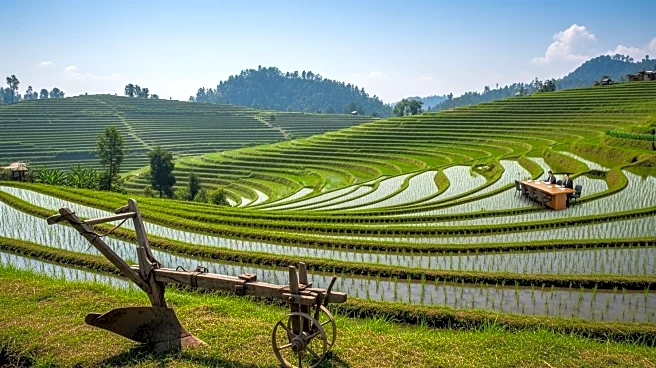What's Happening?
The Food and Agriculture Organization (FAO) is set to recognize 28 new Globally Important Agricultural Heritage Systems (GIAHS) across 14 countries, increasing the total to 102. These systems, which include
traditional farming practices like Mexico City's chinampas and China's Aohan Dryland Farming System, demonstrate how generational knowledge can contribute to climate resilience and food security. The FAO's initiative highlights the importance of agricultural heritage in sustaining biodiversity and supporting livelihoods, especially in the face of climate change and urbanization. The recognition coincides with the FAO's 80th anniversary and the opening of the new Food and Agriculture Museum and Network, aimed at promoting the link between food, culture, and tradition.
Why It's Important?
The expansion of GIAHS recognition by the FAO underscores the critical role of traditional agricultural practices in addressing modern challenges such as climate change and food security. These systems offer sustainable solutions that have been refined over centuries, proving that innovation can be rooted in tradition. By highlighting these practices, the FAO aims to attract investment and support for their preservation and adaptation, ensuring they continue to provide ecological and economic benefits. This initiative not only honors cultural heritage but also positions it as a vital component of global efforts to combat environmental and social issues.
What's Next?
The FAO's recognition of new GIAHS sites is expected to lead to increased investment and support for these traditional agricultural systems. The organization plans to develop frameworks to measure the impact of these practices on biodiversity, food security, and climate adaptation. The newly opened Food and Agriculture Museum and Network will serve as a platform to connect communities and promote awareness of the importance of agricultural heritage. These efforts aim to transform GIAHS from conservation projects into active models for climate resilience, potentially influencing policy and investment decisions worldwide.
Beyond the Headlines
The FAO's initiative highlights the ethical and cultural dimensions of agricultural heritage, emphasizing the need to preserve traditional knowledge as a means of ensuring sustainable development. By integrating these practices into modern agricultural strategies, the FAO seeks to balance technological advancements with ecological preservation. This approach challenges the notion that high-tech solutions are the only path to climate resilience, advocating for a more inclusive and diverse strategy that respects and utilizes historical wisdom.








